Sommaire
- A personal quest in search of tea
- The origin of our products
- Experts in sourcing and creating recipes
- Going directly to the source and working with small producers
- The ingredients at the heart of the flavouring
- A brand with international reach
- A comprehensive ecological approach
- Eco-packaging and eco-design
- Measures to reduce our carbon footprint
- The largest range on the market
- Choosing a Jardins de Gaïa tea, herbal tea or spice is a guarantee of buying an organic, ethical, premium product!
- Our ranges
- Labels and certifications: farming on a small scale which is respectful of the environment
- Organic farming:
- Biodynamic farming:
- Fair trade:
- WFTO : World Fair Trade Organisation
- Fair-Trade: Fair For Life (FFL)
- Fair trade at Jardins de Gaïa:
- CSR (Corporate Social Responsibility)
- The protection of ancient tea trees
- Our commitments over and above farming and fair trade
- Protection of elephants
- Key dates and figures
- From 1994 to the present
- Key figures
- Jardins de Gaïa is also about…
- Sharing ancestral knowledge in a unique place
About us

A personal quest in search of tea
Les Jardins de Gaïa, French pioneers in organic and fair-trade tea, was created by Arlette Rohmer in 1994 and is still an independent, family business today. Almost 30 years of exploration have enabled us to bring you a range of more than 740 organic, fair trade and premium teas, herbal teas and spices, all grown with respect for nature and which are « good for the Earth and good for mankind ».
Our passion for the product, a strong commitment to our partner-producers and the environment along with well-founded expertise when it comes to our recipes make Jardins de Gaïa one of the French market leaders in organic tea.
The origin of our products
Over the years and through the people we have met, we have extended our sourcing to the four corners of the world: from Asia to South America, and from Europe to Africa, our teas, herbal teas and spices come from 20 countries and 40 producers.
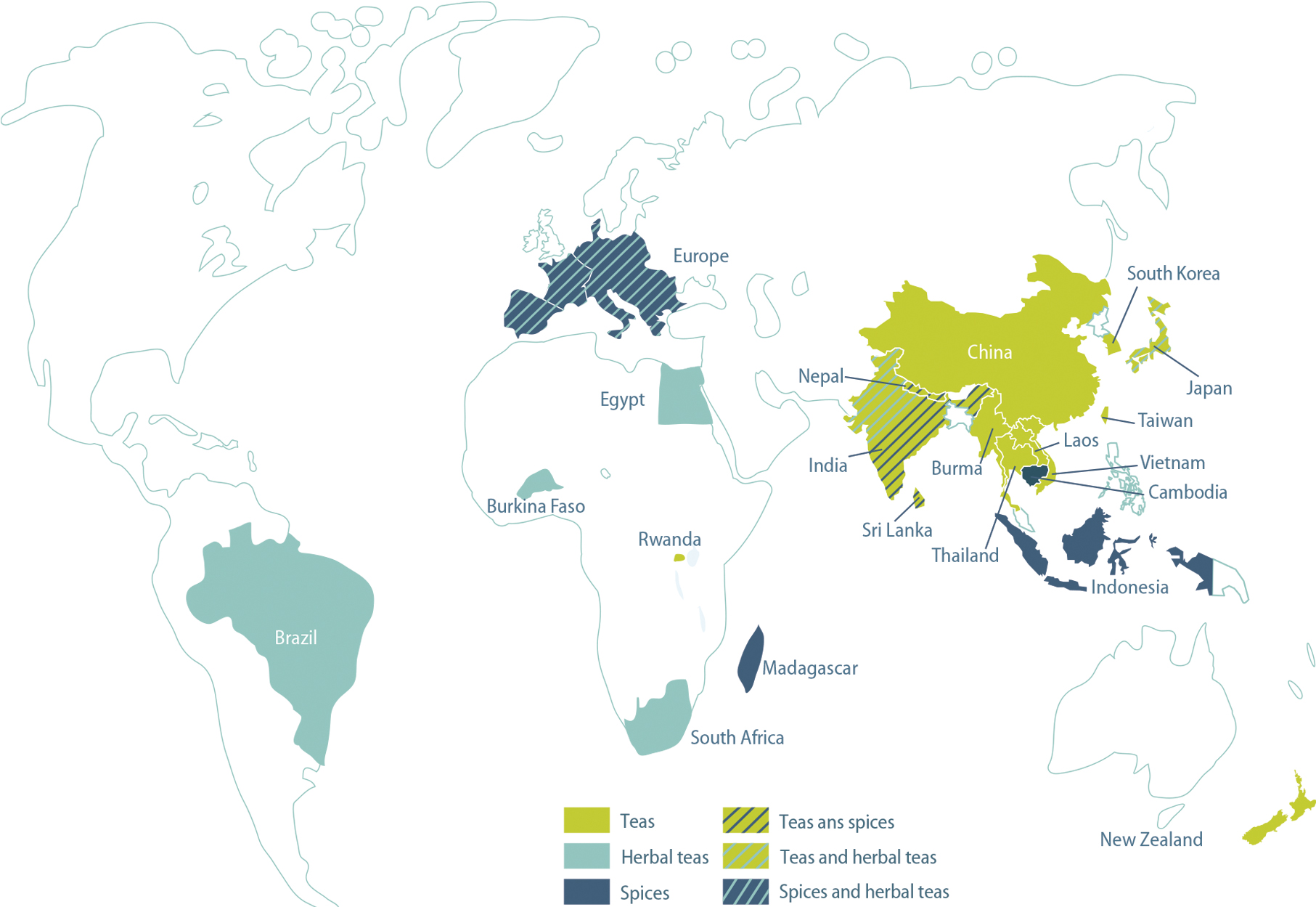
Experts in sourcing and creating recipes
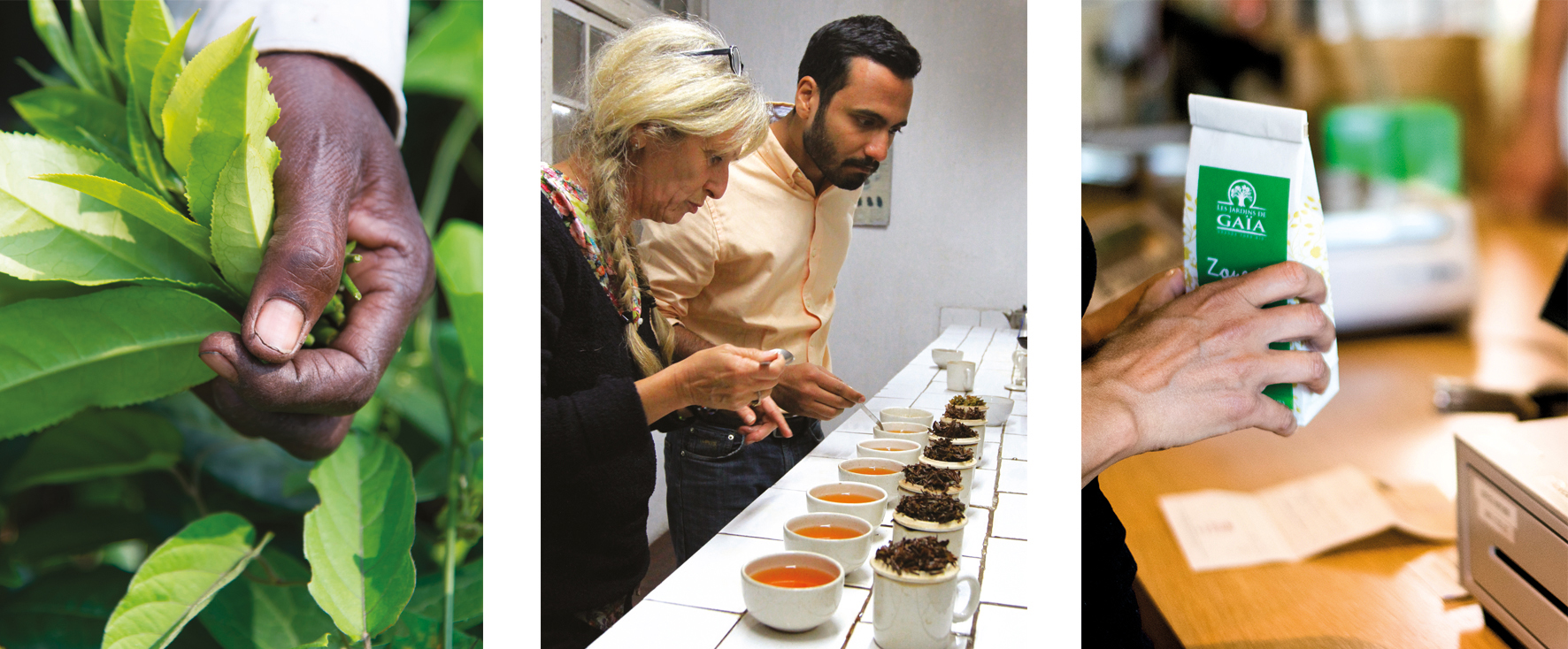
Going directly to the source and working with small producers
We know that patience is essential when working with top-of-the-range organic teas. The secret to the quality is the sometimes delicate production methods which need careful attention. Every step, both in France and elsewhere into world, is carried out with real care to give our teas exceptional flavour. This is why we visit producers regularly to taste and select the teas in their laboratories. The way we work with each of them allows us access to a greater choice, constantly improving tea quality and an increasingly wide and rich palette of tastes.
The flavour qualities of a tea are the result of of the cultivar, the soil, the local climate and the careful attention lavished on it by the producer. Each of the various processes it undergoes are very important when it comes to preserving its original flavours, which is why we have chosen minimal mechanisation at our production site; packaging, flavouring and despatch are done entirely by hand. This arrangement also helps provide local employment, essential for the economy of our rural area.
The ingredients at the heart of the flavouring
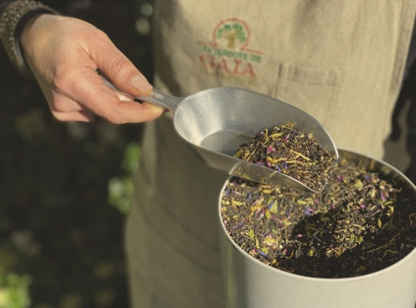 For us, a flavouring is not intended to mask the taste of tea, but rather to enhance it. Thus, each recipe is meticulously prepared taking care to respect the delicacy of the teas used, with all the creativity that is our signature.
For us, a flavouring is not intended to mask the taste of tea, but rather to enhance it. Thus, each recipe is meticulously prepared taking care to respect the delicacy of the teas used, with all the creativity that is our signature.
During this step, the choice of ingredients is crucial, which is why we only use natural flavours, extracts of organic essential oils. Likewise, each fruit, spice and flower is chosen for its origin and provenance. Our recipes are the result of daily inspiration, guided by our curiosity, our passion and a desire to make delicious products for you to discover.
A brand with international reach
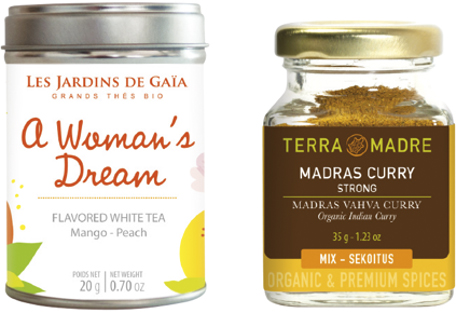 Our products are distinctive thanks to a clever mix of creativity and savoir-faire, both in the recipes and the packaging. This signature is loved by our customers and sought after by our peers to develop their own brands. Our products are available throughout France and are exported: you can find our teas, herbal teas and spices in Belgium, Finland, Sweden, Switzerland, South Korea, Canada, etc.
Our products are distinctive thanks to a clever mix of creativity and savoir-faire, both in the recipes and the packaging. This signature is loved by our customers and sought after by our peers to develop their own brands. Our products are available throughout France and are exported: you can find our teas, herbal teas and spices in Belgium, Finland, Sweden, Switzerland, South Korea, Canada, etc.
A comprehensive ecological approach
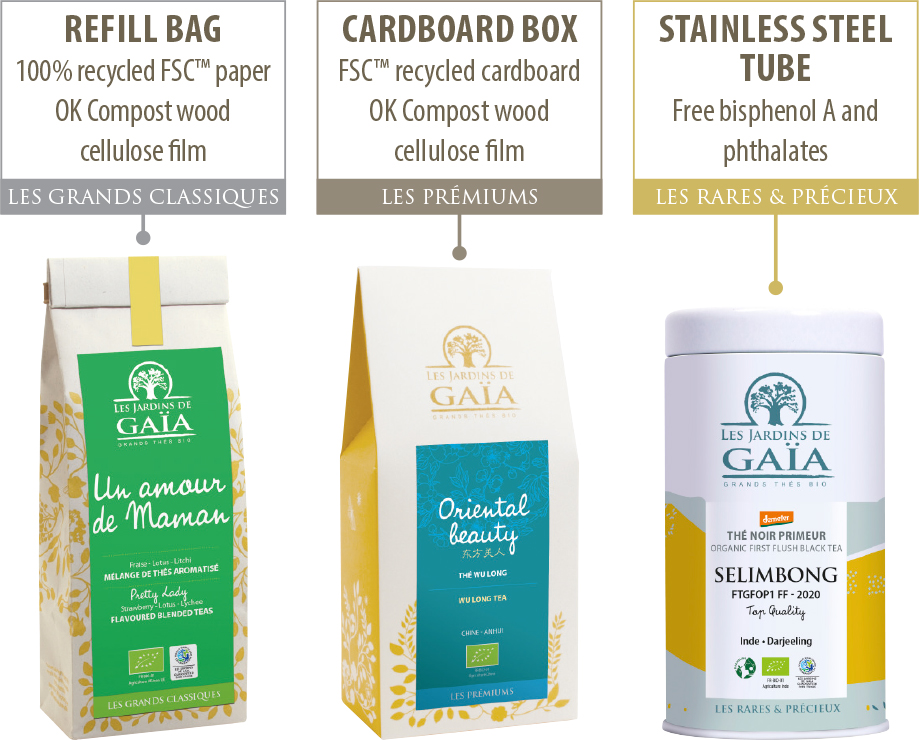 Eco-packaging and eco-design
Eco-packaging and eco-design
Right from the start, we have been determined to package our products in containers that chime with our ecological approach.
Our packaging is designed, developed and produced by us, as part of a continuous research process, with help from suppliers who share our way of working. We pay special attention to the choice of materials to ensure our teas are perfectly preserved. We have incorporated eco-design requirements into the development of our products and we use a French manufacturer for recyclable cardboard and paper, PEFC™, FSC™ certified or recycled, interior film made of OK Compost Home certified wood cellulose, tin caddies free from Bisphenol A, and glues without solvent.
Measures to reduce our carbon footprint
- Transport by sea: our products (excluding first-flushes which are flown over once a year) arrive by river and sea.
- Carbon off-setting: a partnership with the NGO GERES, which promotes renewable energy and fights climate change. For each tonne of CO2 emitted, we provide funding for the installation of biogas digesters in China.
- Renewable energy: our Wittsheim site has been entirely supplied with renewable energy since 2016.
- Selective sorting: waste management is strictly included in the company’s overall approach.
- Principle of the circular economy: we arrange for local artists and craftsmen to reuse some of our waste (recycling packaging, for example).
- Local currency: Jardins de Gaïa was one of the first companies to sign the local currency charter for Centre-Alsace, the Stück. It has been possible to pay with it in our shop since 2016.
The largest range on the market
Choosing a Jardins de Gaïa tea, herbal tea or spice is a guarantee of buying an organic, ethical, premium product!
With more than 650 types of tea and 140 varieties of spices, Jardins de Gaïa currently has the largest organic range from small producers on the French market. This is the result of nearly 30 years of sourcing, endless invention and close relationships with producers. Whether finished products, for wholesale or private labelling, Jardins de Gaïa offer has a huge range of ready-to-go solutions.

Our ranges
Our teas are divided into several ranges to help you make your choice:
- The Great Classics: the basis of our teas, tisanes et spices
- The Premiums: teas and herbal teas
- The Rare & Precious: More than 100 varieties of tea
- Herbal teas: More than 55 varieties
- Teabags: More than 35 varieties in boxes of 20 teabags
- The Militants: 23 varieties in packets and tubes
- The gift packs: Seven tea and herbal tea gift packs and two spice gift packs
- The spices: More than 140 premium, organic spices
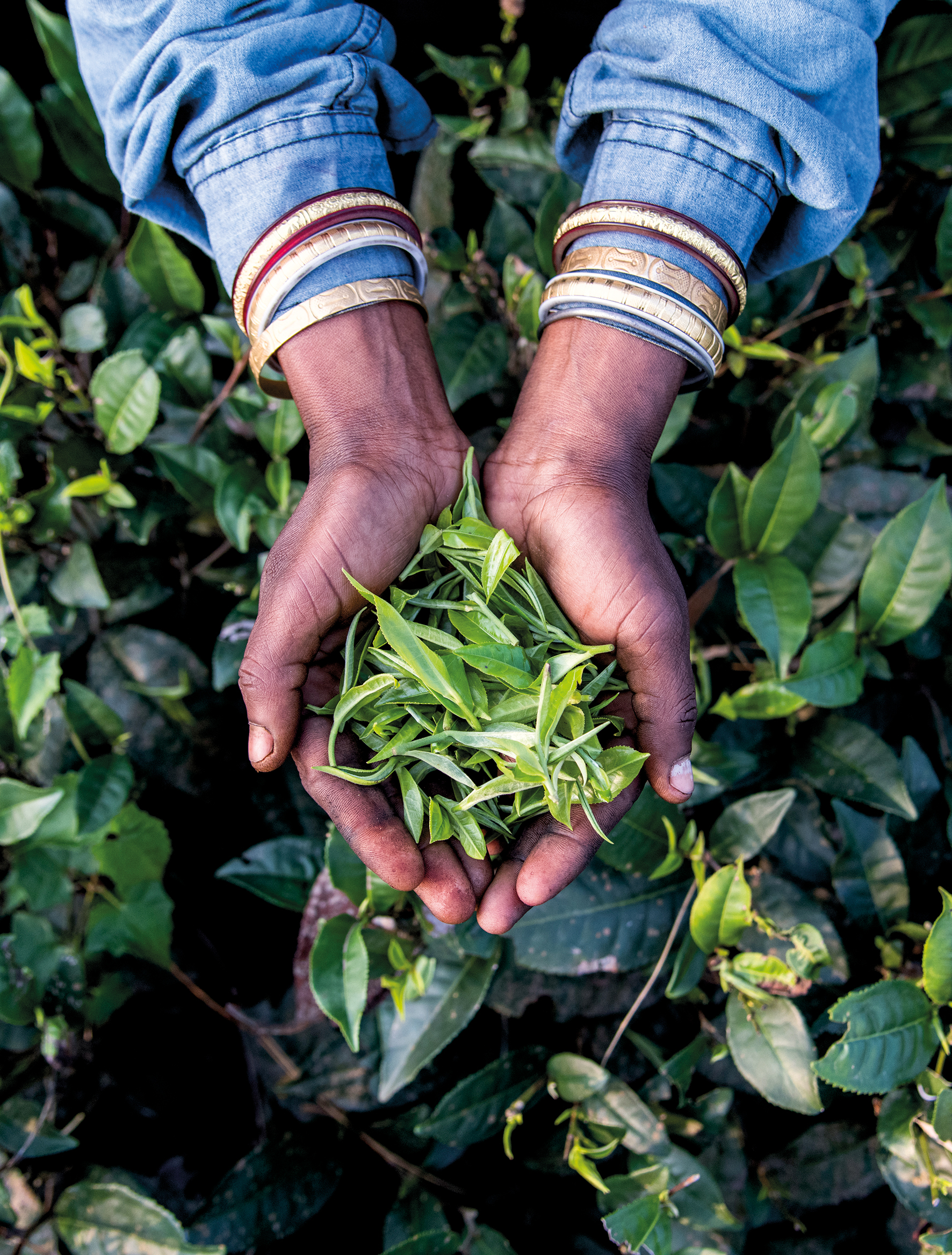 Labels and certifications: farming on a small scale which is respectful of the environment
Labels and certifications: farming on a small scale which is respectful of the environment
“We have always upheld the strong values which are close to our hearts and which have guided us throughout the development of our company. These are the values that have driven us forward in the organic market, that impel us to be responsible and caring towards the planet and mankind, both in France and abroad. These are the values that make us want to go further, to defend and fight for them, to push the limits, to go beyond certifications and specifications, and think constantly of local and global solutions.”
Arlette Rohmer, founder and co-manager of Jardins de Gaïa
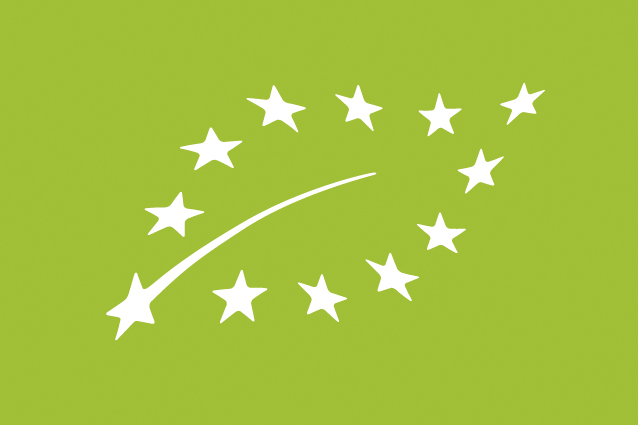 Organic farming:
Organic farming:
Our products have been certified organic ever since the company was founded. We are convinced that respecting the land has a direct impact on the quality of the products, both in terms of health benefits and in the depth of flavours. The chemicals used in intensive farming and the practice of monoculture impoverish the soil and destroy the environment and they are dangerous to the health of workers and consumers. Such crops can contain many harmful chemical residues, which is why we champion organic farming so you can enjoy the aromatic palette of our products with confidence. They are certified by Ecocert SAS, an independent French testing and certification body accredited by COFRAC (the French body responsible for accreditation), in accordance with the ISO Guide65 standard which ensures independence, competence and impartiality. www.ecocert.com/en
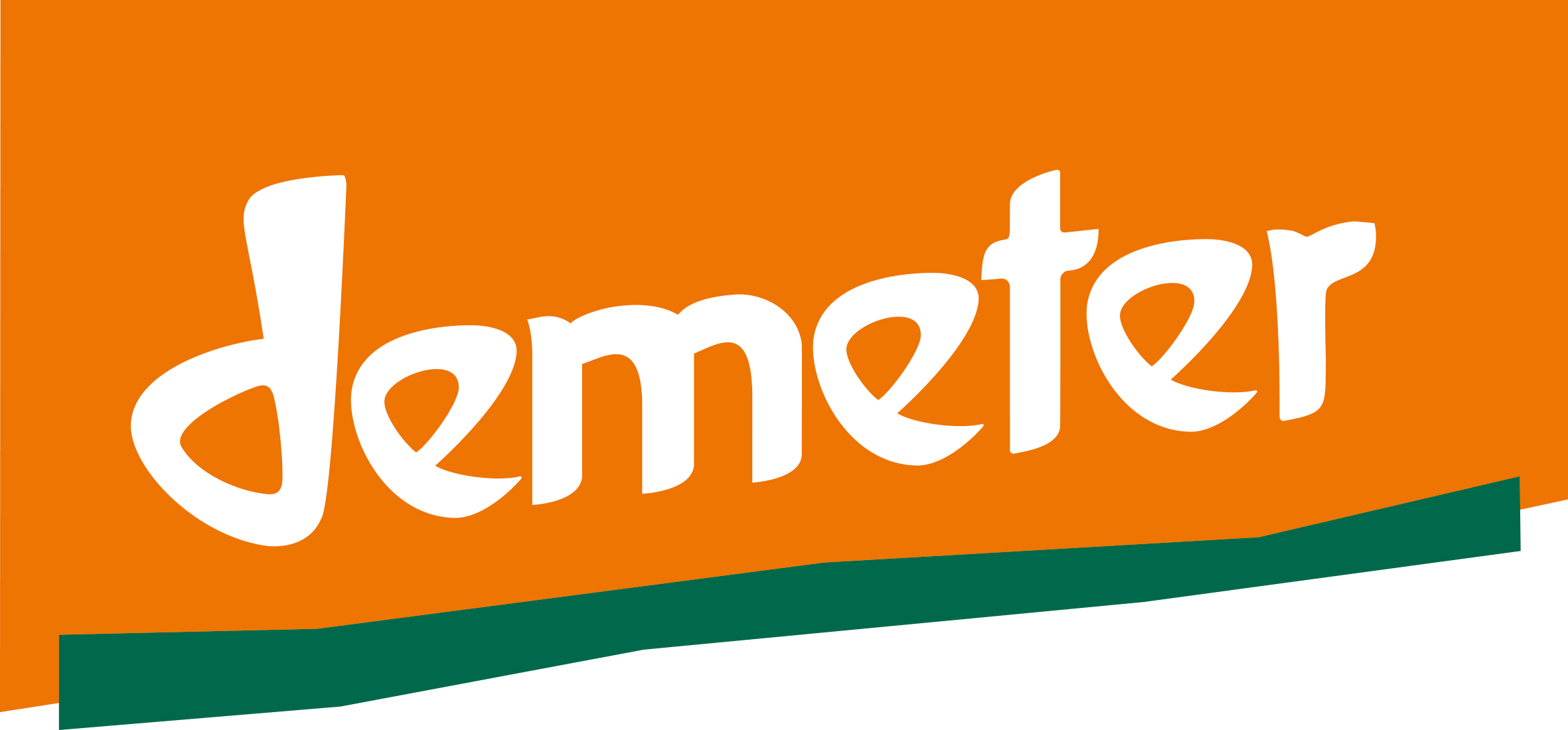 Biodynamic farming:
Biodynamic farming:
We encourage biodynamics, which we believe to be the agriculture of the future. This model of excellence which takes care of mankind by taking care of the soil, respecting natural rhythms and balances, allows us to produce teas of great depth, both in terms of flavour and nutrition. The first of the gardens we work with to be Demeter-certified in 1997 were in Darjeeling and we encourage and support our other partners to follow the same path. Established in 1932, the Demeter logo is used to signify products grown using biodynamics. In addition to meeting European regulation requirements for organic farming, they also meet the criteria set out for biodynamics. www.demeter.fr
Fair trade:
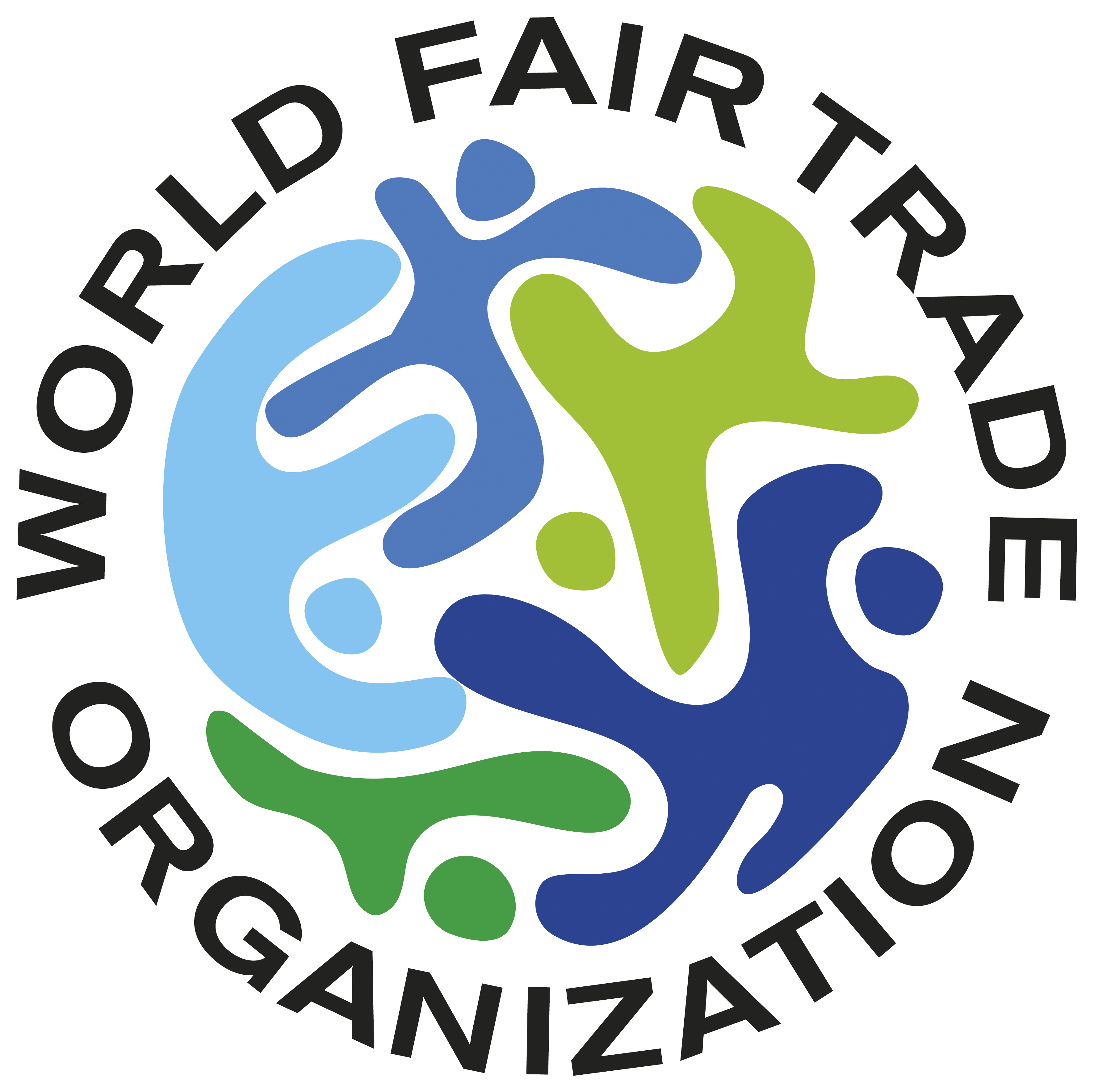 WFTO : World Fair Trade Organisation
WFTO : World Fair Trade Organisation
In 2016 we joined the World Fair Trade Organisation to reaffirm our commitment to fairer, more equitable international trade. We thus moved from guaranteeing a product to guaranteeing an entire industry, by choosing more transparent practices both in France and abroad.
The WFTO strategy is a comprehensive one and has three main aspects:
- Participatory: each member has decision-making power at the AGM
- Demanding: members are required to have an in-depth knowledge of producers’ living conditions, to practice transparency on pricing, to set up regular meetings in the field and on their premises and to be exemplary when it comes to the working conditions of their employees.
- Systemic: the label is a guarantee to consumers that the company actually adheres to the ten essential Fair Trade principles
- (www.wfto.com).
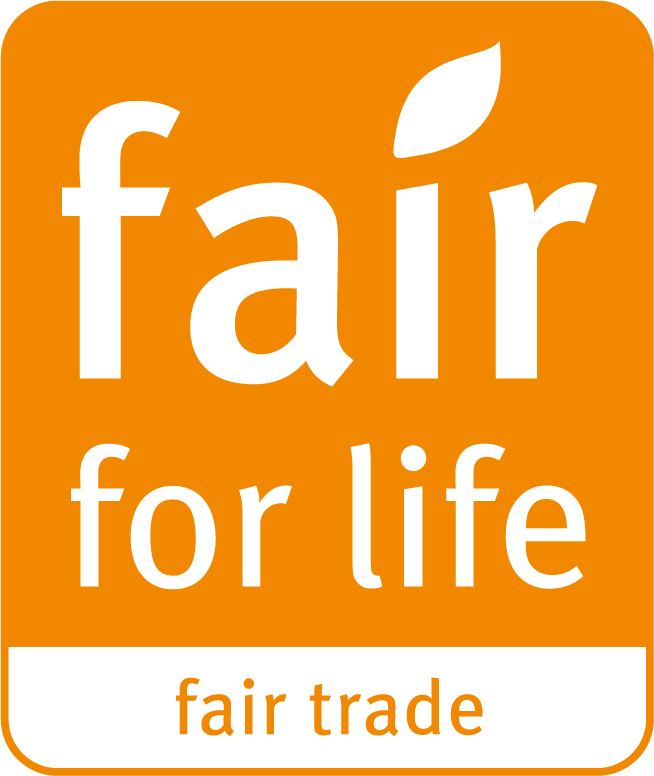 Fair-Trade: Fair For Life (FFL)
Fair-Trade: Fair For Life (FFL)
Fair For Life is a fair trade certification programme for products and sectors, created in 2006. It allows all producers and fair trade businesses to benefit from independent certification guaranteeing: respect for human rights and dignified working conditions, the promotion of biodiversity and respect for ecosystems, sustainable agricultural practices and, finally, a contribution to local development. This certification, resulting from proactive governance for the environment, is essentially aimed at organic products and sectors. More info at: www.fairforlife.org.
Fair trade at Jardins de Gaïa:
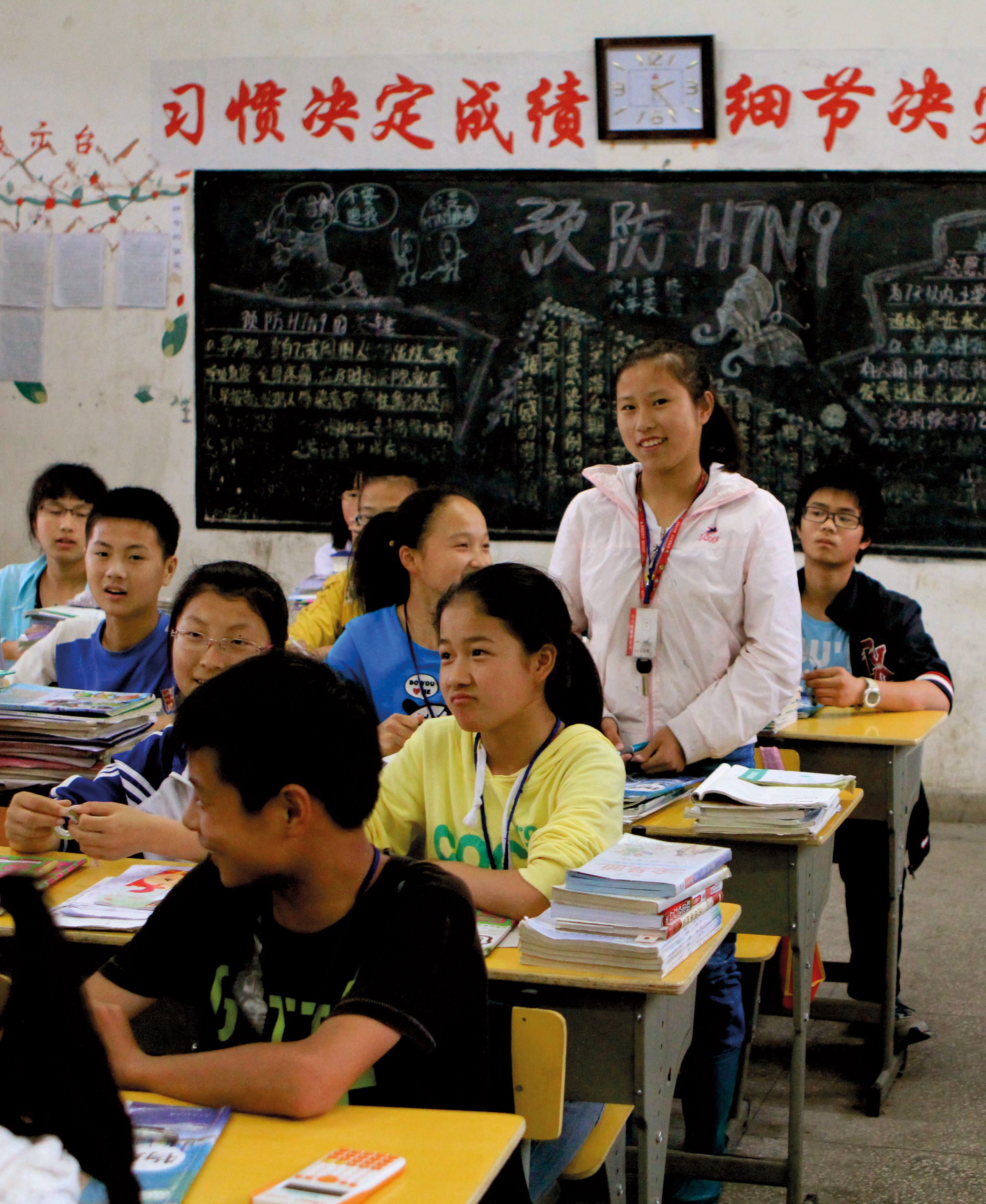 Today, more than 75% of our products are fair trade (WFTO label), an essential certification to guarantee that they come from producers who make a decent living from their work. However, sometimes this is not enough, which is why we go even further:
Today, more than 75% of our products are fair trade (WFTO label), an essential certification to guarantee that they come from producers who make a decent living from their work. However, sometimes this is not enough, which is why we go even further:
- By guaranteeing annual volumes at the fairest prices
- By pre-financing crops where necessary
- By providing additional help (subsidies for the construction of buildings, schools, purchases of agricultural equipment, etc.),
- By supporting projects that ensure sustainable development and the improvement of living conditions for workers and their families,
- By making producers aware of the benefits of biodiversity, and of biodynamic farming,
- By giving priority to small producers because they are the ones who are most vulnerable.
Photo caption: Tuo Chan School in Da Zhang Shan (Zhejiang, China), which was built with the help of the fair trade premium, has 600 pupils aged seven to 16
CSR (Corporate Social Responsibility)
 BioED® is a community of organic companies that go above and beyond the European organic regulations, by incorporating sustainable development into the heart of their businesses while making a positive contribution to transforming society. As a responsible company, Jardins de Gaïa is one of the first companies to have been certified BioED® by Synabio (France’s national union of organic companies) in 2018. Six aspects of the business were carefully assessed: governance, human resources, quality, loyalty of practices, environment and being rooted in the local community. Certification was made in 2018 (www.bioed.fr).
BioED® is a community of organic companies that go above and beyond the European organic regulations, by incorporating sustainable development into the heart of their businesses while making a positive contribution to transforming society. As a responsible company, Jardins de Gaïa is one of the first companies to have been certified BioED® by Synabio (France’s national union of organic companies) in 2018. Six aspects of the business were carefully assessed: governance, human resources, quality, loyalty of practices, environment and being rooted in the local community. Certification was made in 2018 (www.bioed.fr).
The protection of ancient tea trees
Wild Tea: Thé sauvage – original tea tree
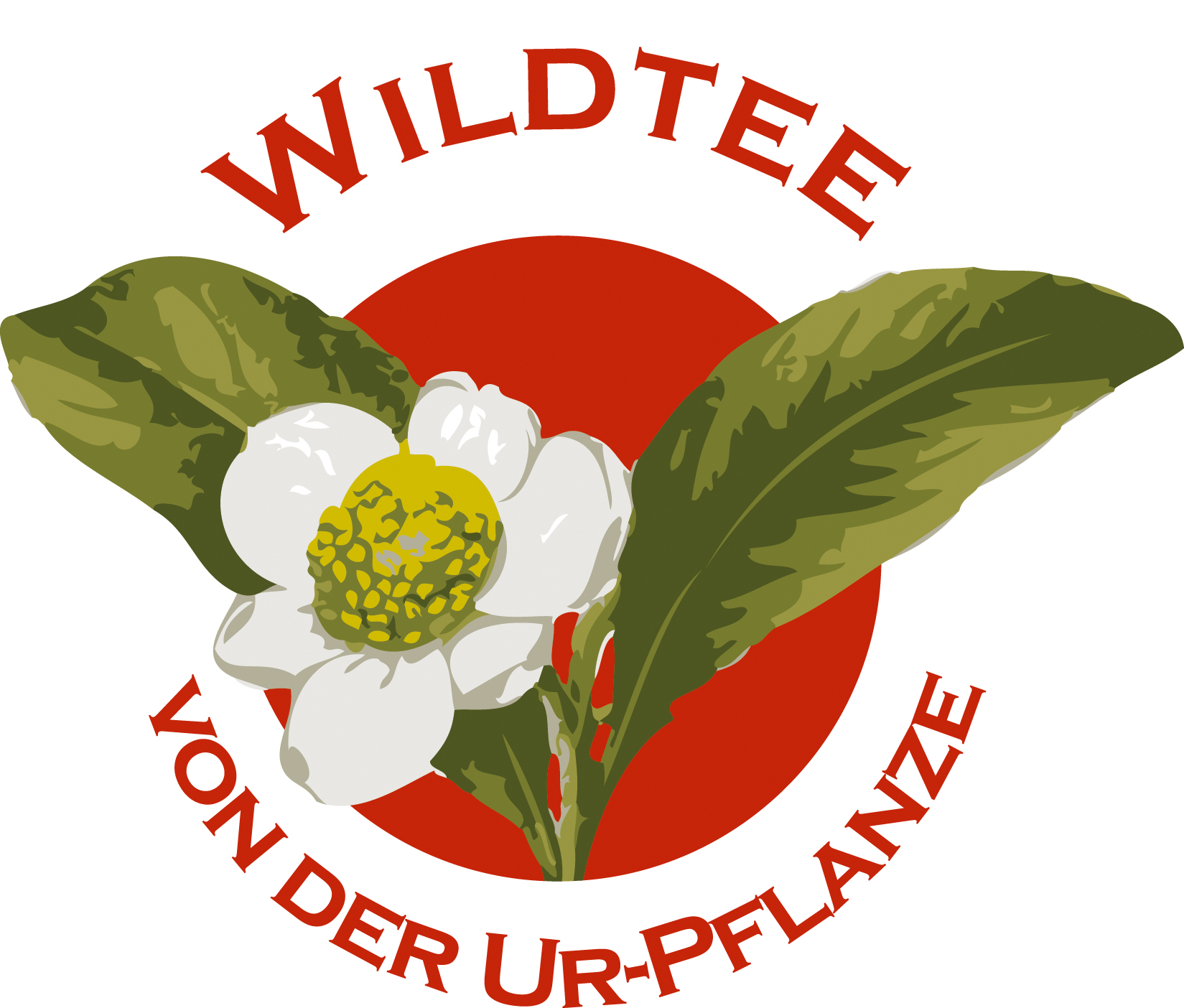 You can identify teas from ancient tea trees by the Thé sauvage original tea tree label. These tea trees, some of them thousands of years old, grow in the Golden Triangle region on the borders of Yunnan in China, Vietnam, Laos, Burma and Thailand. Their sturdy leaves are particularly suitable for making pu’er or dark teas.
You can identify teas from ancient tea trees by the Thé sauvage original tea tree label. These tea trees, some of them thousands of years old, grow in the Golden Triangle region on the borders of Yunnan in China, Vietnam, Laos, Burma and Thailand. Their sturdy leaves are particularly suitable for making pu’er or dark teas.
Our commitments over and above farming and fair trade
 Protection of elephants
Protection of elephants
Certified Elephant Friendly by the Wildlife Friendly Enterprise Network, the Dooars, Darjeeling and Assam Tea Gardens lie in the midst of forest reserves where elephant populations live. The movement of the elephants through the gardens has been a source of conflict between the animals and the people who work there. In order to resolve these problems, our partner conducted an awareness programme for the population with the help of forest officials and NGOs. As protecting the elephants is vital for local biodiversity, facilities and paths have been put in place to allow them to coexist with humans.
Key dates and figures
From 1994 to the present
1994: Creation of Jardins de Gaïa in Wittisheim (Alsace, France)
1995: 1st certification in organic farming for the Selimbong garden (Darjeeling, India)
1996: 1st supply of rooibos from the Wupperthal cooperative (Cederberg, South Africa)
1997: 1st certification in biodynamic farming for the Selimbong garden (Darjeeling, India)
1999: 1st sale of organic Japanese green tea in France
2001: 1st fair trade certifications for the Da Zhang Shan cooperative (Zhejiang, China)
2004: Construction of the headquarters and inauguration of the Tea House and six Japanese gardens at Wittisheim
2007: Creation of the “Issu de petits producteurs” (small producers) logo
2009: Creation of the “Théiers sauvages” (Wild Tea) logo
2010: Expansion of the production site
2011: Acquisition of the premium organic spice company Terra Madre
2013: Launch of the Militant Teas and Rooibos range
2016: Joined the World Fair Trade Organisation (WFTO) for new fair trade labelling aimed at small producers/complete overhaul of the ranges/National Champion at the “European Business Awards” for France
2017: Opening of the Tea School/Winner of the Social Engagement trophy and the CSR Trophy
2018: BioeEd® certification for CSR (Corporate Social responsibility)/Pop-up shop in Paris/ Launch of the Dhyāna et Déjantés range
2019: Celebrated our 25th birthday with a party for 5,000 guests and numerous producers
2020 : Creation of the Jardins de Gaïa Endowment Fund.
Key figures
+ 600 varieties of teas and infusions
+ 140 types of spices
+ 360 tonnes of teas, herbal teas, spices and flowers sold
+ 160 tonnes of flavoured teas and herbal teas or blends
+ €12M turnover
+ 80 permanent members of staff
≈ 70% of whom are women
+ 1700 sellers in France and in 20 countries
+ 40 partner producers in 24 countries of whom 303 are small producers
= 100% of raw materials* organic
= 75% of raw materials* fair trade
= 10% of raw materials* biodynamic
*Raw materials: teas, herbal teas, plants, spices, flowers, fruits, flavourings, essential oils and extracts
+ €140,000 distributed over six years to partner charities from the Militant Teas and Rooibos range
Jardins de Gaïa is also about…
Sharing ancestral knowledge in a unique place
In the heart of central Alsace, tucked away in the shelter of a bamboo grove and surrounded by six Zen Japanese gardens, our Tea House is the place to be for meetings, tastings and exhibitions. In the shop next to the Tea House, visitors will find all our teas, herbal teas, spices and accessories. In 2017 we opened the Tea School so that the wider public to benefit from our knowledge about this ancient drink and all its secrets.
Catégorie à la une Recettes







